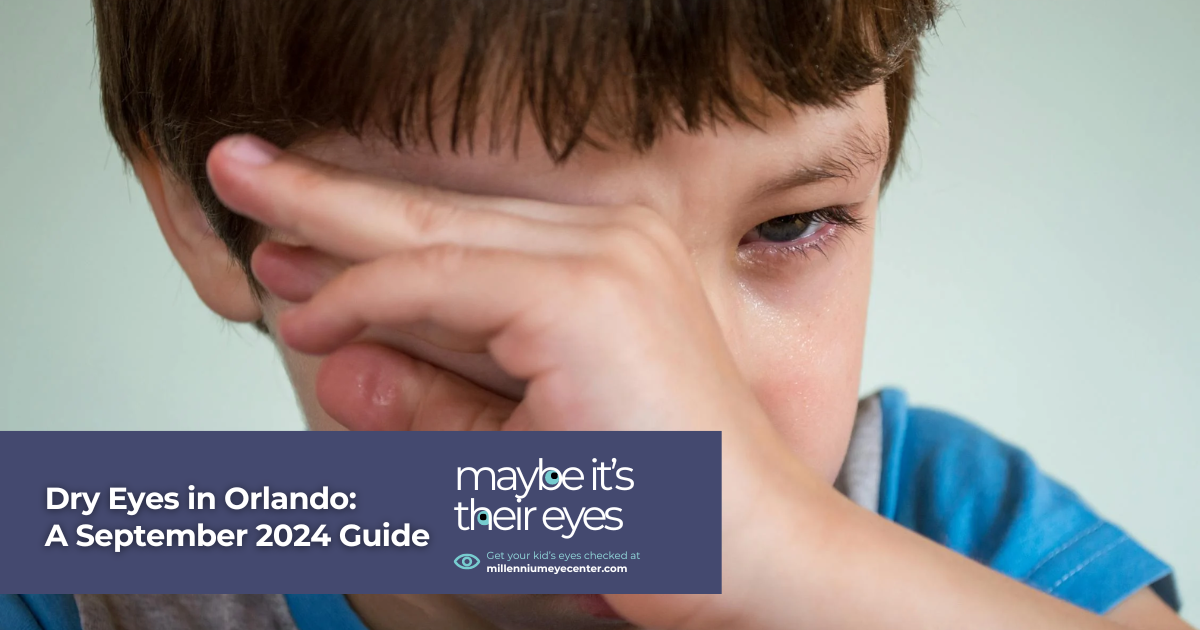Orlando’s subtropical climate, with its high humidity and exposure to allergens, can contribute to various eye problems, including dry eye.
This condition is characterized by insufficient tear production or poor tear quality, leading to a range of uncomfortable symptoms. If you’re experiencing dry eye in Orlando, consulting with an eye doctor is essential for proper diagnosis and treatment.
Why Dry Eye is Common in Orlando
Several factors contribute to the prevalence of dry eye in Orlando:
- Climate: The subtropical climate, with its hot temperatures and humidity, can cause the eyes to dry out more quickly.
- Allergens: Pollen, mold, and other allergens are abundant in Orlando, and exposure to these can irritate the eyes and reduce tear production.
- Air Conditioning: Constant exposure to air conditioning can dry out the eyes, especially during the hot summer months.
- Screen Time: Excessive screen time from computers, smartphones, and tablets can also contribute to dry eye.
Symptoms of Dry Eye
The symptoms of dry eye can vary from person to person but often include:
- Dryness or a gritty feeling in the eyes
- Burning or stinging sensation
- Redness and irritation
- Sensitivity to light
- Blurred vision
- Stringy mucus in the eyes
- Frequent blinking
Treatment Options for Dry Eye
If you’re experiencing dry eye symptoms, it’s important to consult with an eye doctor for a proper diagnosis and treatment plan. Some common treatment options include:
- Artificial Tears: Over-the-counter artificial tears can help lubricate the eyes and relieve dryness.
- Prescription Eye Drops: In severe cases, your eye doctor may prescribe prescription eye drops to address underlying causes of dry eye.
- Lid Hygiene: Cleaning the eyelids regularly can help remove debris and reduce inflammation.
- Environmental Modifications: Adjusting your environment, such as using a humidifier or avoiding excessive screen time, can help alleviate symptoms.
- Vitamin Supplements: There are vitamin supplements that can help dry eyes like Omega-3.
Preventing Dry Eye through Integrative Eye Care
While it may not be possible to completely prevent dry eye, taking certain steps can help reduce your risk:
1. Prioritize Rest and Relaxation
- Quality Sleep: Aim for 7-9 hours of uninterrupted sleep each night to allow your body to rejuvenate and reduce stress.
- Stress Management: Practice relaxation techniques like meditation, deep breathing, or yoga to lower cortisol levels, which can contribute to inflammation and eye discomfort.
2. Stay Hydrated
- Adequate Water Intake: Drink plenty of water throughout the day to maintain optimal hydration, as dehydration can exacerbate dry eye symptoms.
3. Mind Your Gut Health
- Healthy Diet: Consume a diet rich in fiber, fruits, vegetables, and whole grains to support a healthy gut microbiome.
- Regular Bowel Movements: Address constipation promptly to prevent systemic inflammation that can impact eye health.
4. Nourish Your Body
- Essential Nutrients: Incorporate foods rich in omega-3 fatty acids, antioxidants, and vitamins A, C, and E to support overall eye health.
- Avoid Irritants: Be mindful of foods and beverages that can trigger allergies or sensitivities, as these can contribute to eye irritation.
If you’re experiencing dry eye symptoms in Orlando, don’t hesitate to schedule an appointment with an eye doctor. With proper diagnosis and treatment, you can effectively manage this condition and improve your overall eye health.
Millennium Eye Center is a leading provider of comprehensive eye care in the Orlando area. Our experienced team of optometrists can help you manage your astigmatism and achieve optimal eye health.
Whether the best choice is glasses, contacts, or other treatment, we understand that the optimal vision correction solution is one that’s tailored to each individual patient. To schedule an appointment with our Pink Eye Expert, Dr. Lauretta Justin, click HERE or text us at 407-292-9812.
Thank you for choosing us as your family’s partners in lifelong vision health. We treasure the trust you place in our practice!
Top image used is a License-free image from Pixabay.
Disclaimer: The content on this blog is not intended to be a substitute for professional medical advice, diagnosis, or treatment. Always seek the advice of qualified health providers with questions you may have regarding medical conditions.

